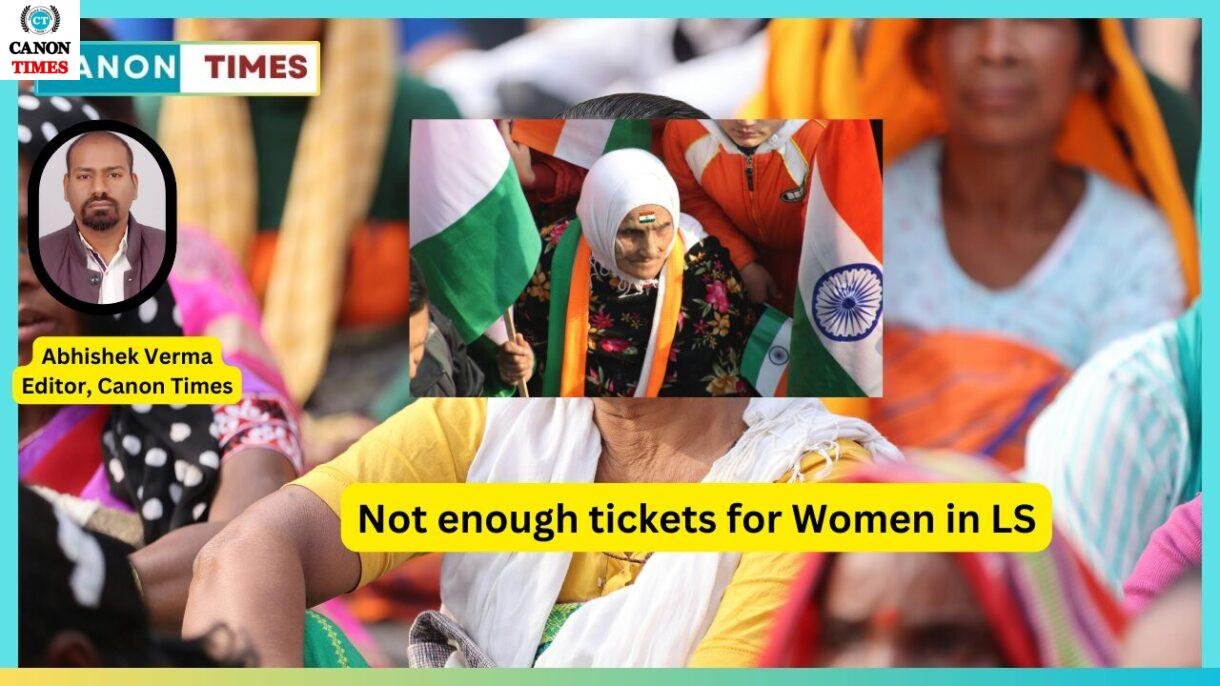As you may remember, there was a lot of backlash when the women Reservation Bill was enacted by Parliament during a special session last year. The Congress party was the main opponent. It criticised the ruling party for engaging in a gimmick and questioned why these objections could not be put into effect immediately rather than after the conclusion of the delimitation process, which is scheduled to start in 2026. The fact that the Bill only called for 33% of seats in state and federal legislatures to be reserved for women, despite the fact that women make up almost half of the 97 crore voters, infuriated several opponents. Criticism was being directed at the audience, as usual. As the Lok Sabha election nomination process continues, the political parties’ hypocrisy in supporting women’s rights has once again come to light. In the past, women have not always received fair treatment; their low presence in public and political spheres has not adequately reflected their overwhelming numbers. Women’s representation in all spheres of life has gradually increased as a consequence of the courageous battle that female activists have fought over the years. It is wonderful to see women creating a name for themselves in a variety of vocations. In fields such as law, accounting, education, management, high technology, media, and so on, women are catching up to males, but there is still a long way to go before they are on par with them in managerial roles. Indeed, women continue to trail behind males in holding leadership positions across a range of occupations. Nonetheless, women’s concerns may be adequately taken into account in policy-making and governance if they are represented fairly and equally in the federal and provincial legislatures. Although there are a few women serving in the federal and state legislatures, some may argue that they support male politicians more than women, yet their sheer existence encourages regular women across the nation to think about entering the traditionally male-dominated field.
Strangely, all political parties have attempted to court women by offering them special initiatives, yearly and monthly stipends, job reservations, etc., yet they have not allowed enough women to be nominated to run for office. The Aam Aadmi Party’s resounding victory in the Punjab Assembly election two years ago was largely due to its pledge to provide every woman who is eighteen years of age or older with a monthly sum of Rs 1,000. Although the pledge has not yet materialised, the AAP has fallen behind, even in providing tickets for women to vote in the current Lok Sabha election. The Congress has pledged to provide women with bank accounts worth Rs. 1 lakh and 50% reservation in all central government posts as part of its present platform. Naturally, even in the event that the Congress were to take control later this year, the pledge would undoubtedly stay on paper. The Congress has fallen behind the other parties in terms of nominations for the Lok Sabha, even though they are all far from meeting the planned one-third quota for women.

Women have only received roughly 12% of the Congress tickets issued thus far. Even though the BJP is also below the 33% threshold, 66 of its declared candidates, or 17%, are female. Not much can be expected from the regional parties, including Mayawati’s BSP, in terms of women’s participation. The argument that women aren’t winnable is used to justify not offering them tickets to Parliamentary and Assembly elections. This is just an easy way to justify things.
It is improbable that adequately prepared candidates for Assembly and Parliamentary elections would emerge unless you actively encourage women to enter local government politics. As a sort of training ground, municipal authorities ought to be used to prepare women for positions at the state and federal levels. The smaller percentage of females compared to males in school and university may be due to historical causes.
Gender equality is thankfully gaining ground 75 years after independence, as evidenced by the success of women’s cricket. However, gender equality will truly take root when state and federal laws reflect the views of a significant portion of the female population and when women are treated equally both inside and outside of the home and in all spheres of society. Men and women are not able to do most things in life. For instance, consider how many women work in prominent roles at the Indian Space Research Organisation. When Chandrayaan-3 touched down on the southern surface of the moon recently, we rejoiced in their accomplishment. Instead of securing a seat for the Lok Sabha or a state Assembly, our politicians seem to think landing on the moon is simpler. It was more important than ever to question that outdated mindset.
Abhishek Verma
Author: This news is edited by: Abhishek Verma, (Editor, CANON TIMES)
Authentic news.






